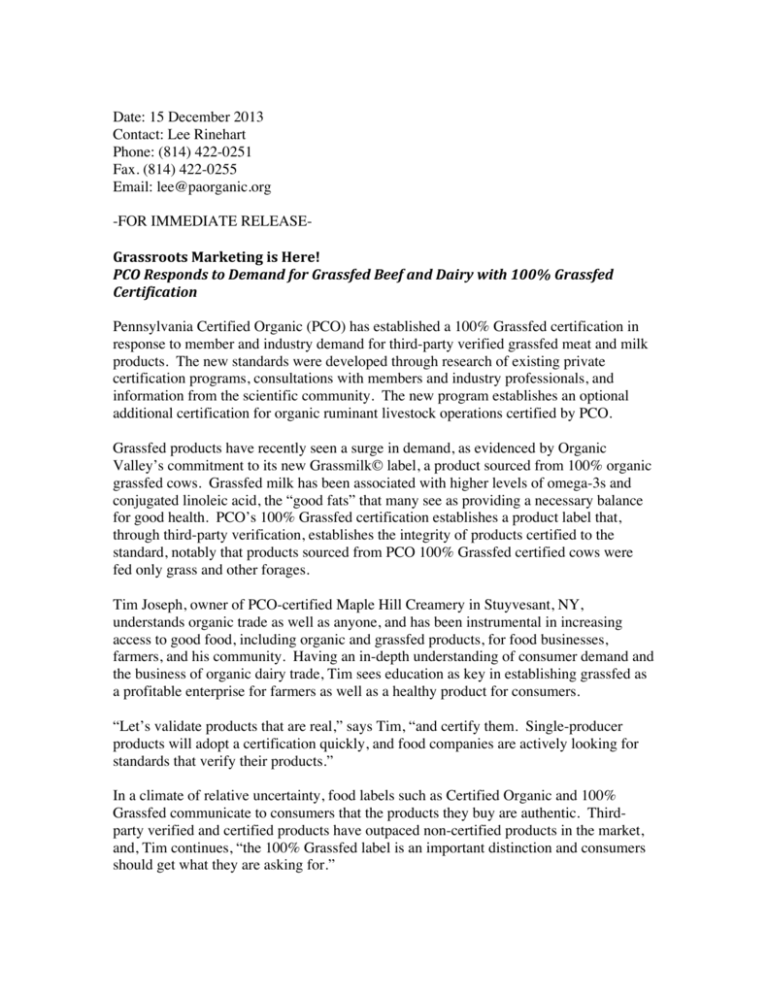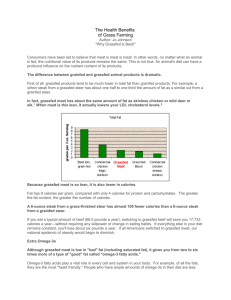PCO Responds to Demand for Grassfed Beef and Dairy with 100
advertisement

Date: 15 December 2013 Contact: Lee Rinehart Phone: (814) 422-0251 Fax. (814) 422-0255 Email: lee@paorganic.org -FOR IMMEDIATE RELEASEGrassroots Marketing is Here! PCO Responds to Demand for Grassfed Beef and Dairy with 100% Grassfed Certification Pennsylvania Certified Organic (PCO) has established a 100% Grassfed certification in response to member and industry demand for third-party verified grassfed meat and milk products. The new standards were developed through research of existing private certification programs, consultations with members and industry professionals, and information from the scientific community. The new program establishes an optional additional certification for organic ruminant livestock operations certified by PCO. Grassfed products have recently seen a surge in demand, as evidenced by Organic Valley’s commitment to its new Grassmilk© label, a product sourced from 100% organic grassfed cows. Grassfed milk has been associated with higher levels of omega-3s and conjugated linoleic acid, the “good fats” that many see as providing a necessary balance for good health. PCO’s 100% Grassfed certification establishes a product label that, through third-party verification, establishes the integrity of products certified to the standard, notably that products sourced from PCO 100% Grassfed certified cows were fed only grass and other forages. Tim Joseph, owner of PCO-certified Maple Hill Creamery in Stuyvesant, NY, understands organic trade as well as anyone, and has been instrumental in increasing access to good food, including organic and grassfed products, for food businesses, farmers, and his community. Having an in-depth understanding of consumer demand and the business of organic dairy trade, Tim sees education as key in establishing grassfed as a profitable enterprise for farmers as well as a healthy product for consumers. “Let’s validate products that are real,” says Tim, “and certify them. Single-producer products will adopt a certification quickly, and food companies are actively looking for standards that verify their products.” In a climate of relative uncertainty, food labels such as Certified Organic and 100% Grassfed communicate to consumers that the products they buy are authentic. Thirdparty verified and certified products have outpaced non-certified products in the market, and, Tim continues, “the 100% Grassfed label is an important distinction and consumers should get what they are asking for.” Producers are requesting education and information on grassfed production as well, especially when it comes to the production practices necessary to ensure animal health and productivity during the transition to a grass-only system. Like organic production, grass-based livestock production relies on biodiversity and ecological complexity to maintain production with the use of less costly inputs, especially feedstuffs and health management. Cattle producers recognize that grazing and pasture access can lower production costs, reduce animal stress, and boost the animal’s immune system. But success in a 100% grassfed system requires high-quality pasture and livestock that are adapted to a highforage diet that provides the energy and protein needed to produce milk. Producers who have effectively made a transition to 100% grass note that grazing management, notably maintaining adequate pasture recovery, pasture diversity in time and space, and maintaining dense pastures are important to successful transitions. PCO is dedicated to providing the educational support needed to assist producers certifying to the 100% Grassfed standard. Transitioning to 100% Grassfed Goals and asset inventory: what it is you expect to do and get out of grazing cows? How does it relate to your overall farm and family goals? Identify problems to overcome and opportunities you can take advantage of. List your on-farm assets such as labor, land, livestock, forages, water, lanes, fences, buildings, and machinery. Breeds and animal types: important traits in grass-based dairy production are grazing behavior, frame size, and milk fat and protein yields which are heritable. Select bulls and cows that have these heritable traits. Transition existing cows slowly and cull and replace non-performers. Cow nutrition should be closely observed while transitioning to grass-only feeding to ensure the cows maintain body condition, breed back on time, and continue to produce milk sustainably. Pasture recovery and diversity: recovery time of pastures after grazing is the foundation of 100% grassfed production. Base your grazing management on appropriate recovery time for the season and encourage pasture diversity through such practices as frost seeding, cover crops, and annual grasses. Grazing season extension: graze cover crops in the spring and hay aftermath in the winter to increase time grazing. Use summer annuals, brassicas in the fall, or stockpile pasture for grazing into December. Adapted from Dairy Production on Pasture: An Introduction to Grass-Based and Seasonal Dairying, 2009 NCAT How to apply for PCO 100% Grassfed Certification PCO is currently accepting applications for the 100% Grassfed program from PCOcertified organic operations, or from operations applying for certification by PCO under the USDA's National Organic Program. Certified producers can claim products are certified under the PCO 100% Grassfed Certification Program, and may use the PCO 100% Grassfed Certification seal on certified product labeling and marketing materials. Currently certified operators who are interested in 100% Grassfed certification should contact their Certification Specialist at (814) 422-0251, and new applicants should contact Heather Donald at (814) 422-0251 or heather@paorganic.org. Pennsylvania Certified Organic is a non-profit organization that educates and certifies organic growers and handlers in Pennsylvania and the surrounding region. PCO certifies more than 500 farming and food production operations, including produce, field crops, herbs, wild crops, dairy products, poultry products, value-added products, livestock, mushrooms, maple, snack foods, coffee, tea, cosmetics, and more. To learn more about Pennsylvania Certified Organic, or to apply for organic certification, call 814-422-0251 or visit our website at www.paorganic.org. ###




